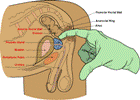Anal Cancer: Early Detection
Anal Cancer: Early Detection
Screening tests are done to check for diseases in people who don’t have symptoms. There are screening tests available to check for anal cancer in people who may be at increased risk. It’s easier to treat anal cancer if it's found early, while it's small and before it has spread.
Tests to screen for anal cancer include:
- Digital rectal exam (DRE). During a DRE, your healthcare provider puts a gloved, lubricated finger into your rectum. He or she feels for hard or lumpy areas. This isn’t just done to check for anal cancer. It also may be used to check for prostate cancer in men and rectal cancer in both men and women.
- Anal cytology. If you are at high risk for anal cancer, your healthcare provider may recommend anal cytology, often called an anal Pap test. This is like the screening test women have for cervical cancer. A swab is used to remove some cells from your anus. The cells are checked under a microscope to look for signs of changes that could lead to cancer and cancer itself.
- Anoscopy. This test allows the healthcare provider to look at the inside of the anus and rectum. A short, hollow tube with a light on it is put into the rectum. Through it the provider can get a close look at the lining tissues. If changes are seen, a chemical can be put on the area to help show the changed cells. A small bit of the cells can be taken out and checked for cancer or other changes.
Who should be screened for anal cancer?
A healthcare provider may suggest screening for anal cancer in these cases:
- Men who have sex with men
- Women with a history of cervical, vaginal, or vulvar cancer
- Men or women who are HIV-positive
- All people who have had organ transplants
- Anyone with a history of anal warts
If testing shows abnormal cells under a microscope, your healthcare provider will refer you for a biopsy. This is when a small piece of the area is removed. Then a healthcare provider looks at it closely to see if there are cancer cells in it.
Not all experts agree that anal cancer screening is helpful. There's also no agreement on which tests should be used. There are no recommendations on how often screening should be done. There's also no research showing that screening can help healthcare providers find and treat cell changes early to reduce anal cancer risk. Still, you may want to talk to your healthcare provider about your anal cancer risk. Ask if you regular screening might be right for you.
Updated:
June 27, 2019
Reviewed By:
Kim Stump-Sutliff RN MSN AOCNS,Lu Cunningham
